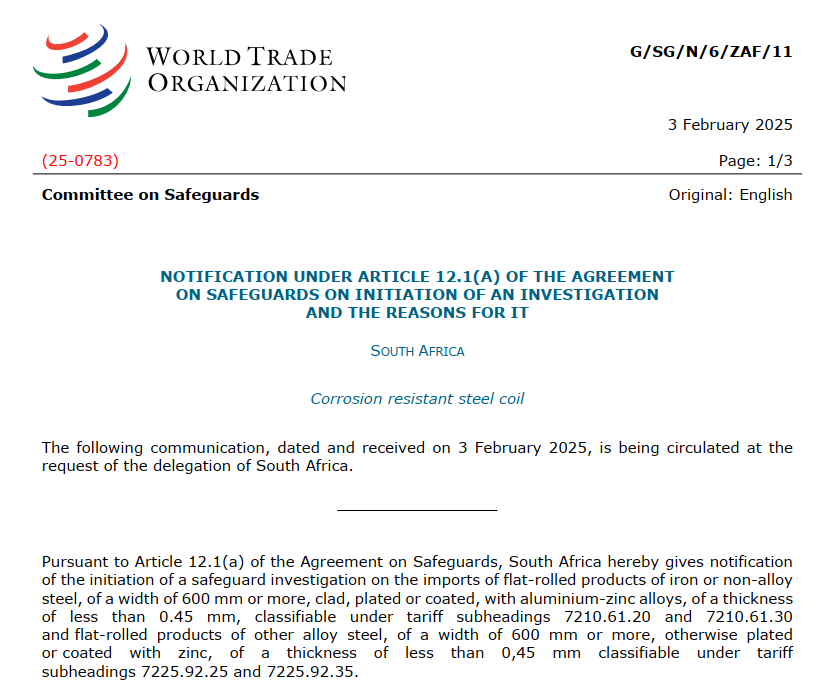On February 3, 2025, the World Trade Organization (WTO) announced that South Africa’s International Trade Administration Commission (ITAC) had officially initiated a safeguard investigation into imported corrosion-resistant steel coils.
The case was filed by ArcelorMittal South Africa (AMSA) and is based on an investigation period from May 1, 2021, to April 30, 2024. The investigated products fall under the category of corrosion-resistant steel coils, classified under HS codes 7210.61.20, 7210.61.30, 7225.92.25, and 7225.92.35.
In the complaint, the petitioner argued that the surge in imports of corrosion-resistant steel coils was due to unexpected developments arising from the implementation of commitments under the Uruguay Round Negotiations (1986–1994). The separation of HS codes into non-alloy and alloy steel categories allegedly led to a shift in imports between the two classifications, resulting in an uncontrollable increase in total imports.
Additionally, the petitioner highlighted that the global supply of corrosion-resistant steel had significantly exceeded demand, leading to a sudden influx of imports into the Southern African Customs Union (SACU), which includes South Africa, Botswana, Lesotho, Namibia, and Swaziland.
The petitioner further emphasized that China had not fully transitioned into a market economy as committed to the WTO, while its economy had been declining since 1994. Due to oversupply issues, major Chinese steel producers were forced to increase exports, especially as their domestic market continued to shrink. This situation prompted China to export at lower prices to clear inventory.
Moreover, numerous countries worldwide have implemented safeguard measures, such as tariff increases, to protect their domestic steel industries. As a result, the risk of surplus steel being diverted to SACU has risen.
These factors have severely impacted South Africa’s domestic steel industry, as evidenced by declines in production, revenue, profit, and market share during the period from May 1, 2022, to April 30, 2024.
According to the investigation procedures, relevant manufacturers and exporters must register as interested parties within 20 days from the initiation date. They may also submit written comments on the case within the same timeframe.
Notably, Vietnam is already subject to both anti-dumping and countervailing duty investigations on corrosion-resistant steel (CORE) exports to the United States. The U.S. previously alleged a dumping margin of 195.23% on Vietnamese corrosion-resistant steel products—higher than the margin claimed in the petition and the highest among the 10 investigated countries.
For the countervailing duty investigation, the U.S. has initiated probes into 26 government subsidy programs, including preferential loans, corporate income tax incentives, import tax exemptions and refunds, and land-related benefits.
Given these developments, Vietnamese enterprises should adjust their business strategies accordingly to ensure they are not subjected to unfavorable safeguard duties or lose business opportunities in this high-potential market.
To protect their legitimate interests, related manufacturers and exporters should familiarize themselves with the procedure and actively contact Vietnamese law firms specializing in anti-dumping and trade remedy for timely assistance.
Download related information on the end-of-term review here.
ASL Law is a leading full-service and independent Vietnamese law firm made up of experienced and talented lawyers. ASL Law is ranked as the top tier Law Firm in Vietnam by Legal500, Asia Law, WTR, and Asia Business Law Journal. Based in both Hanoi and Ho Chi Minh City in Vietnam, the firm’s main purpose is to provide the most practical, efficient and lawful advice to its domestic and international clients. If we can be of assistance, please email to [email protected].
ASL LAW is the top-tier Vietnam law firm for Anti-dumping & countervailing. If you need any advice, please contact us for further information or collaboration.

 Tiếng Việt
Tiếng Việt 中文 (中国)
中文 (中国) 日本語
日本語

